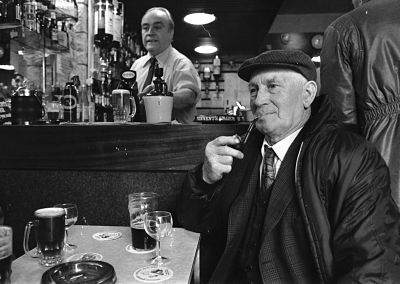 The British pub is an institution, and a way of life. Pubs are places to go, to socialise, relax and have a drink. If you want to learn something about British culture, then the pub is as good a place to start as any other because pub culture is an integral part of British life.
The British pub is an institution, and a way of life. Pubs are places to go, to socialise, relax and have a drink. If you want to learn something about British culture, then the pub is as good a place to start as any other because pub culture is an integral part of British life.The pub, short for 'public house', is an integral part of British life. In many parts of the world, most bars are little more than functional drinking holes. In Britain, though, a pub is typically much more than this: it can be a meeting place, an entertainment centre or the focal point of a community. As a visitor, popping into one or two pubs will help you to understand what the country and its people are like, beyond the usual tourist images of castles, royals and Shakespeare. The British Beer and Pub Association (BBPA) estimates that 80 per cent of adults consider themselves 'pub goers', and over 15 million -- nearly a third of the adult population -- drink in a pub at least once a week.
Whether you want to sample the atmosphere, meet the locals, try the beer or just quench a thirst, here are some facts, tips and social rules to help you get the best out of a trip to a British boozer.
Choosing A Pub
If you are thinking of looking for a typical British pub, think again because there is no such thing. They come in all shapes, sizes and styles: from the traditional country pub, with real ales and an open fire, usually accompanied by an old man and his dog, to the bustling city-centre hotspot, with hordes of teens and twenty somethings shouting to each other over ear-splitting music.
Many pubs are the hub for their local community, which means they are a great way to meet people. Some are also known for a certain thing, such as a venue for a certain genre of music or a quiz night. There are pubs that are known for being a place where people gather to watch a certain sport or support a certain football team. It is best to check out the vibe because it can be an uncomfortable experience if you support one team and everyone else is supporting the opposition.
You will also find certain pubs are known as a hangout for certain nationalities, such as the “Aussies (Australians) and the “Kiwis” (New Zealanders).
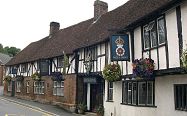
The Rose & Crown in Salisbury dates back to the 1300's
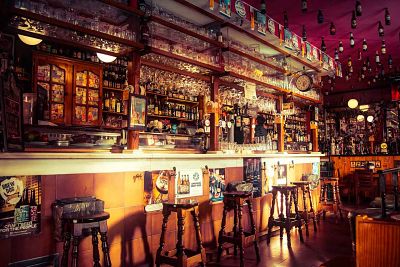 The centres of the larger cities have the widest variety of pubs within easy reach of each other, and of the main visitor attractions. Some of them are old – very old. Ye Olde Trip To Jerusalem, in Nottingham, is believed to be the oldest in England, dating back to 1189. Times are changing, though: many pubs are being taken over by large chain corporations and sadly losing some of their character in the process, and in recent years have seen the rise of theme pubs and modern European-style bars.
The centres of the larger cities have the widest variety of pubs within easy reach of each other, and of the main visitor attractions. Some of them are old – very old. Ye Olde Trip To Jerusalem, in Nottingham, is believed to be the oldest in England, dating back to 1189. Times are changing, though: many pubs are being taken over by large chain corporations and sadly losing some of their character in the process, and in recent years have seen the rise of theme pubs and modern European-style bars.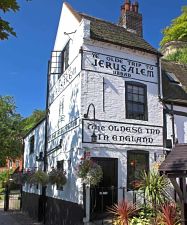 In the suburbs, and in the smaller towns and villages, most pubs are best described as locals. The atmosphere in these places can vary - some are very friendly, others can seem a little unwelcoming and even intimidating to outsiders. If you walk into a pub and get a bad feeling about it, do not hesitate to walk straight out again and look for somewhere more enticing - the chances are that you will find it.
In the suburbs, and in the smaller towns and villages, most pubs are best described as locals. The atmosphere in these places can vary - some are very friendly, others can seem a little unwelcoming and even intimidating to outsiders. If you walk into a pub and get a bad feeling about it, do not hesitate to walk straight out again and look for somewhere more enticing - the chances are that you will find it.Who Is In Charge
Most pubs are tied houses, owned and operated by breweries. A tied house must sell the beer provided by the brewery that owns it, but can usually sell an additional guest beer. It might be managed by a local landlord who is really a tenant, on a lease basis, or by a manager on the brewery's payroll. Chain pubs are owned by companies which do not actually brew their own beer, although some of them are former breweries. A free house is fully independent, and can sell any brand of beer.
What Do Pubs Serve
Pubs traditionally serve alcoholic beverages such as lager, bitter, cider and spirits, but soft drinks or non alcoholic drinks are also readily available. Usually a request for a a lager, ale or bitter will get you a whole pint unless you specify you want a half. It is extremely unlikely that a pub would serve you a fancy cocktail.
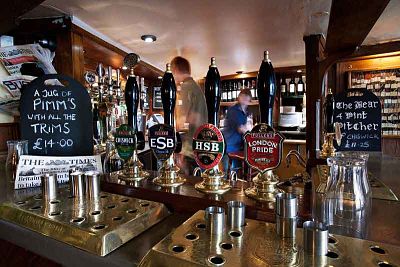
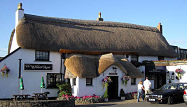
How to Order A Drink
In almost all pubs you need to order your drink at the bar, so do not wait around for someone to take your order from your table. The only exception to this is when you go to a posh pub or a “gastro pub” for a meal. At these pubs you will get table service.
Pubs are busy at peak times such as after work and at the weekends. It is advisable to edge your way to the front of the queue but strictly No pushing in otherwise you will become unpopular. Once at the front, get the attention of the bar staff by having your money ready. They will most likely say “what will it be” or “what are you having” and you give them your order.
In some pubs they will ask if you want to start a tab, which means do you want to leave your debit or credit card behind the bar. In exchange they will give you a card with a number. Each time you place an order the staff will ask for that number and at the end of the evening they will present the bill to you.
Once you have received your drinks it is customary to move away from the bar to make room for the thirsty drinkers patiently waiting behind you. Whilst at the bar ordering your own drinks, you may be asked to order drinks for somebody behind you.Give the order to the bar staff and take the money from the guest and give the guest the drinks and the change. Similarly you may be asked to “allow the dog to see the rabbit” which is another way of saying move out of the way.
What To Drink
Unless you enjoy being openly laughed at, never under any circumstances, go into a British pub and ask for 'a beer'. The beer comes in several types, mostly very different to each other. Ask for a specific type, or use a brand name.
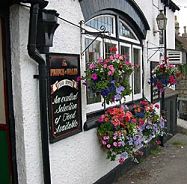 For a taste of beer that is very popular and distinctively British, try a pint of bitter. Named after its bitter taste, this brownish-red ale is strongly flavoured with hops, has a wide range of strengths, flavours and aromas, thanks to the variety of brewing techniques used in different regions. Some pubs offer a long list of bitters, usually including guest beers which they only keep for a few days. Bitter is the main reason why we Brits are often ridiculed for drinking 'warm beer'. It is not warm - it just is not ice-cold, and we would not want it to be.
For a taste of beer that is very popular and distinctively British, try a pint of bitter. Named after its bitter taste, this brownish-red ale is strongly flavoured with hops, has a wide range of strengths, flavours and aromas, thanks to the variety of brewing techniques used in different regions. Some pubs offer a long list of bitters, usually including guest beers which they only keep for a few days. Bitter is the main reason why we Brits are often ridiculed for drinking 'warm beer'. It is not warm - it just is not ice-cold, and we would not want it to be.If you want something more familiar (and cold), pubs invariably offer lager - the type of clear, light, sparkling beer found in most countries. Lager was almost non-existent in Britain until the 1960's, except in Scotland, but it now accounts for around half of the beer sold.
Other types include mild, quite similar to bitter, but generally darker and weaker; and stout,the thick, black beer usually associated with Ireland. Guinness is on tap in nearly every pub; British stouts are not so commonly found on draught. There is also cider, made from fermented apple juice, and not to be confused with the unfermented American drink of the same name, and dangerously popular in south-western England.
Scotland has its own categories of ale: a bitter-like beer known as heavy with two sub-categories: 70 shillingand 80 shilling, and light or 60 shilling, comparable to English and Welsh mild. The higher the number, the stronger the beer.
Draught beer is served in pints or half pints. Bottled beer, including foreign brands, is easily available. When ordering beer, ask for 'a pint of...', 'a half of...' or 'a bottle of...'.
Spirits and limited ranges of wines are widely served in pubs. Low-alcohol beers are usually on offer, but a popular alternative is shandy, a 50-50 mix of draught beer and lemonade (ask for a bitter shandy or a lager shandy). Soft drinks are always available, such as fruit juices, mineral water, coffee, tea and the usual well-known sodas.
Tipping
You do not normally tip bar staff in the UK. If you want to say thanks, then offer to buy them a drink. They can then choose to accept the drink or take the value of the drink in the form of a tip. Some pubs have an “employee jar” where you can place the loose change.
Talking To A Stranger
One of the great things about the pub culture in the UK is that you can strike up a conversation with a stranger and even make new friends. It might be a passing comment about the weather or the football scores. It could also be something weightier, such as something in the news or about politics. Whatever the topic is, join in! It is fun, and you may even get a drink bought for you, but remember to return the gesture.
Buying A Round
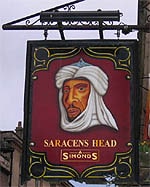 If you are with a group of friends and you are drinking, then getting your round in is an essential part of pub culture. It is not uncommon to be asked “what is your poison” as a way of asking you what you would like to drink. The appropriate reply would be a pint or half pint of what ever you are drinking. One would not change ones drink from a half pint of bitter to a double scotch. If there is a designated driver, they normally get their drinks paid for, as they do not get to drink alcohol or at least not as much as everyone else. And the golden rule is never leave the pub when it is your round!
If you are with a group of friends and you are drinking, then getting your round in is an essential part of pub culture. It is not uncommon to be asked “what is your poison” as a way of asking you what you would like to drink. The appropriate reply would be a pint or half pint of what ever you are drinking. One would not change ones drink from a half pint of bitter to a double scotch. If there is a designated driver, they normally get their drinks paid for, as they do not get to drink alcohol or at least not as much as everyone else. And the golden rule is never leave the pub when it is your round!Cheers
Holding up your drink and clinking your glass against everyone else’s whilst making eye contact and saying “cheers” “bottoms up” “down the hatch” is a must before you start drinking. The custom is about acknowledging friendships and the fact that you are all gathered to have a nice time.
How To Carry Drinks
If it is your round and you are in a big group, then it is common to ask someone to help you bring back the drinks without spilling them.
One tactic you can use to help you get the drinks back to the table without spillages is to shout out “mind your backs” as you negotiate your way back to the table. It may not always work but you will find people tend to make way for you to pass through.
Food
Until quite recently, few pubs offered anything more substantial than peanuts, crisps - 'chips' in the US, and the ultimate pub snack: pork scratchings. Many small pubs still do not, but the overall trend is towards providing more, and better, food. The BBPA claims that British pubs now serve over a billion meals per year.
Some just offer sandwiches, while others have simple pub grub-- meat pies, sausages with mashed potatoes, and so on. Many larger pubs have specific areas reserved for eating, and offer more variety and quality. At the top end of the scale is the recent phenomenon of the gastropub, where the food is more sophisticated and cosmopolitan, and expensive.
The social code is if you are feeling a bit peckish you will ask people in your group what flavour of crisps they like. You then share the snacks by ripping the bag open so the crisps are piled on the torn foil.
Ordering Food
A pub is unlike a restaurant – you have to go up to the bar to place your order. The signal to show that you are ready to order is holding your money in your hand, so that it is visible to the person behind the bar. Once you have placed your order you will be given a table number that you place on your table. The food will then be brought to the table.
Bar etiquette is important. While waiting to be served, stay patient, and try not to shout out your order before someone who has been waiting longer. Whatever you do, do not wave your money around - Brits really do not like this kind of thing. Just try to maintain eye contact, to make sure they know you are there. Be polite and respectful: bar staff in Britain do not appreciate being treated like servants.
The bar staff will not keep a tab for you -- drinks must be paid for as soon as they have been served. Tipping is not expected. In fact, it is almost unheard of. But if you are buying a large round, or staying in the same pub for quite a while, you could buy the barman or barmaid a drink while you are ordering (the code for this is '...and one for yourself') -- this is not mandatory by any means, but it is not unusual either.
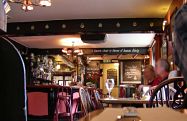
Last Orders
Last orders are usually around 10.30pm or 11pm on a Sunday. Bar staff will ring the bell to signal it is time to place your last orders. They will then ring it again to signal the bar is closing. No more orders can be placed after the second bell.
Licensing Laws
The minimum drinking age is 18. Children of 14 or over are allowed into pubs, but cannot drink alcohol, except for over-16's having meals in designated eating areas, accompanied by adults. A child under 14, if accompanied by an adult, is allowed into the bar area if the pub has a 'children's certificate' -- these pubs usually make it clear that children are welcome.
Not long ago, the smell of cigarette smoke was an inescapable part of pub life. Since the start of July 2007, though, smoking has been banned in all public buildings, including pubs, in England. Similar laws had already been passed in Scotland and Wales.
Some of this may seem a little strange if you are unfamiliar with it -- but do not let it put you off. If you have not been to a British pub, you have not really been to Britain. So why not try one or two? And by the way, mine is a pint of bitter.
